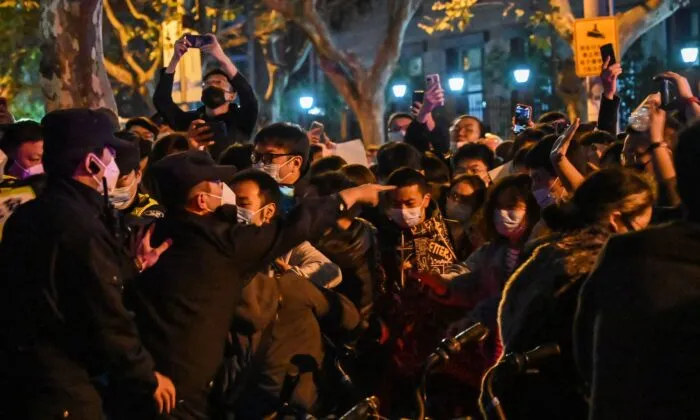Table of Contents
Klaus Schwab may be a fan of China’s totalitarian government, but increasing numbers of Chinese are not so sanguine.
At his annual Bond Villain Retreat in Davos earlier this year, Schwab praised Xi Xinping’s China as having “brought us some sunshine”. He also waxed eloquent about “the Chinese Dream”, as a role model for Chairman Klaus’ “global dream”.
For more and more Chinese, though, Xi’s China is looking more like a nightmare.
Crowds have chanted “down with the Communist Party” and “Xi Jinping, step down” in an extraordinary wave of protests across China sparked by anger at draconian Covid restrictions.
Just as the mainstream media have largely ignored mass protests in the Netherlands and Brazil, the unprecedented wave of protest sweeping Chinese cities has barely met with a ripple of interest for weeks. But leaked videos have shown extraordinary scenes of mass unrest that would normally be unthinkable in the Chinese Communist Party’s “Harmonious Society”.
Anti-government protests on a scale not seen since 1989’s Tiananmen massacre broke out on Saturday in cities including Xi’an, Nanjing and Shanghai, three of China’s most politically influential cities.
“Down with the Communist party” an angry crowd chanted on Saturday night in Shanghai, a city of more than 25 million people that was brutally locked down for three months earlier in the year.
The protesters sang China’s national anthem and held up sheets of blank white paper, a popular symbol of resistance in China where posting anti-government slogans online or displaying them in public can result in swift arrest.
The blank sheets of paper are a form of silent protest. They’re not actually saying anything anti-government that they could be prosecuted for. Not that that stops the goon squads – in China or in its camp-followers in the West. Earlier this year, Australian China critic Drew Pavlou was arrested in Brisbane for holding a blank sheet of paper outside the Chinese consulate.
But not all Chinese are protesting silently.
Other protesters were shockingly blunt, even as they were surrounded by large numbers of police. “Xi Jinping, step down,” some shouted. Others called out “We want freedom” and “Xinjiang, end lockdown.”
In Nanjing, China’s republican capital before the communists took power, hundreds of university students gathered at a night-time vigil on Saturday, shining the lights on their smartphones in unison.
Another group of students protested in Xi’an, a former imperial Chinese capital.
The largest crowds gathered in Urumqi in Xinjiang where thousands resisted police as they demanded “end the lockdown” and shouted “I don’t have money to feed myself.”
Xinjiang is, of course, the site of China’s modern-day genocide against Uyghur Chinese, who’ve been interned by the millions in gigantic concentration camps. But it was an apartment block fire in Urumqi that sparked the current wave of unrest. Twenty people, including three children, burned to death.
Many residents linked the tragedy to Mr Xi’s signature “dynamic zero Covid” policy, which they believe stopped victims from escaping the flames, although Chinese authorities deny this.
The fire tragedy follows on from the horrifying footage of people in cities committing suicide by leaping from the windows of the apartments they’d been locked in. Other videos record the eerie sound of apartment residents screaming out of their windows.
Disturbingly for the Communist Party leadership, the spreading tumult follows weeks of riots across the country, including in Guangzhou in China’s south, Chongqing in China’s west and Beijing.
“I’ve lived in China for 30 years, and I’ve never seen such a brazenly open and sustained expression of rage … This is a serious test of CCP governance,” said David Moser, the director of Chinese Studies at Beijing Capital Normal University.
It’s also a test of the Great Chinese Firewall, the repressive pall of near-complete government censorship of internet communications.
A simultaneous flood of anger online appeared to overwhelm China’s formidable internet censorship regime over the weekend. Commenters shared stories of deaths and economic stress that have been linked to China’s heavy-handed Covid policy […]
Many online netizens vented after seeing videos of the World Cup in Qatar, where fans from around the globe are gathered without masks.
That followed weeks of saturated Chinese media coverage of a maskless Mr Xi in Bali and Bangkok, shaking hands with other world leaders.
The Australian
The Australian
It appears as though the Chinese could give Victorians a lesson or two about standing up to dictators.









